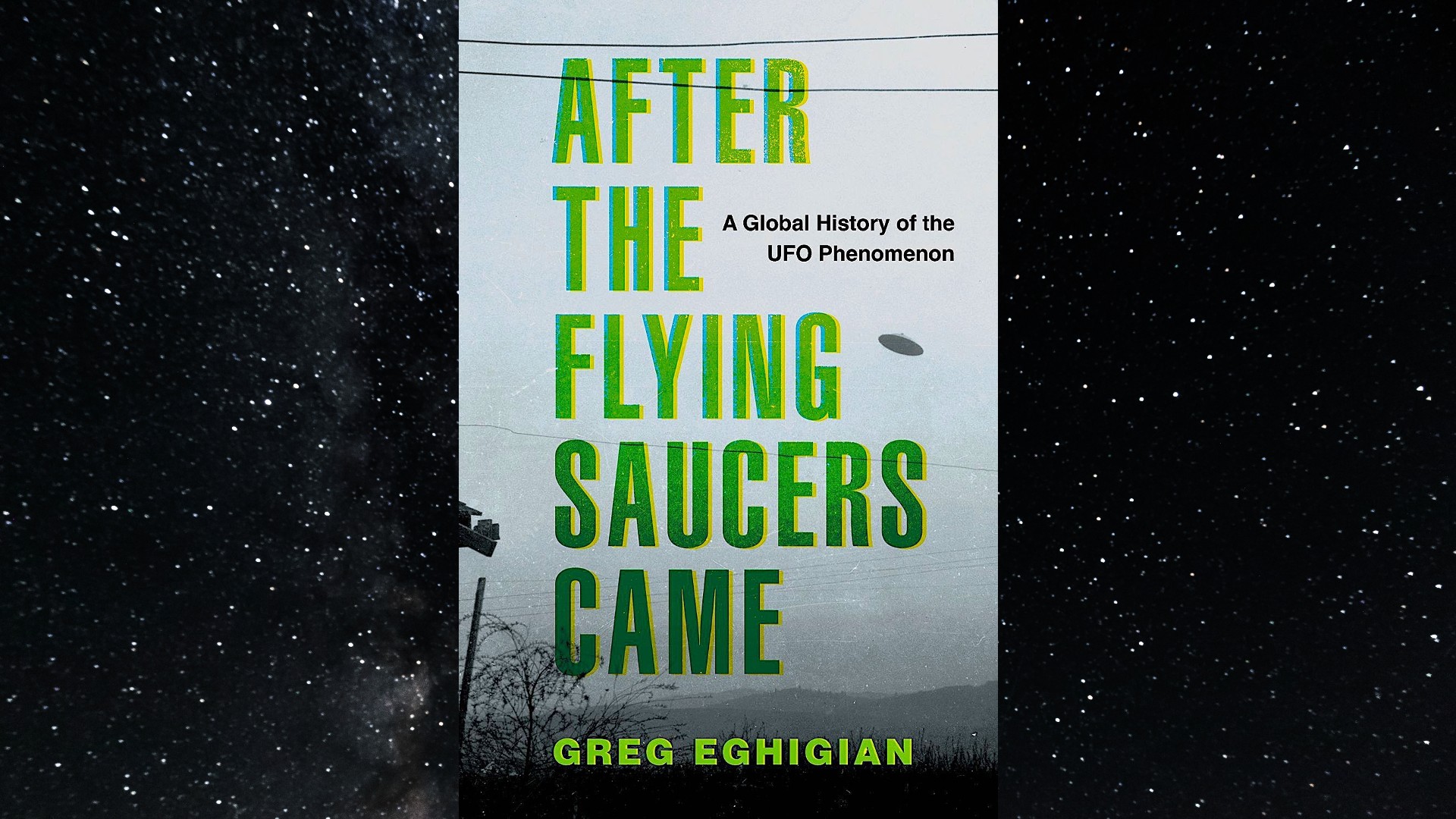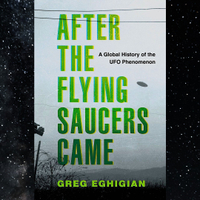
Providing an academic lens through which to view the huge interest and hysteria surrounding unidentified flying objects since pilot Kenneth A. Arnold witnessed what he called "flying disks or saucers" while cruising past Mt. Rainier on June 24,1947, a new book titled "After the Flying Saucers Came: A Global History of the UFO Phenomenon" has just been released from Oxford University Press.
Author Greg Eghigian is a professor of history and bioethics at Penn State University who spent nearly a decade delving into the subject of UFOs for this project, which was based on exhaustive archival research, interviews, and newspaper reports swirling around these mysterious aerial sightings.
Eghigian's illuminating 400-page book chronicles how the phenomenon began right here in America then blossomed into a global obsession over the next few decades up to today's digital age government studies of "unidentified aerial phenomena" (UAP).
After the Flying Saucers Came: A Global History of the UFO Phenomenon: $28.49 at Amazon
Greg Eghigian's 'After the Flying Saucers' came explores the history of the UFO phenomenon beginning with Kenneth Arnold's famous sighting in 1947 and up through the present day.
Eghigian credits this newest wave of mania as erupting from a New York Times article in December 2017 regarding a secret government program to study UFOS.
"When that dropped, then subsequent films, photos and more stories, that's when it all exploded," he tells Space.com. "As a mainstream media phenomenon, UFOs were kind of dead for a good long period of time and that’s really the thing that ushered it in. The veteran ufologists refer to people as 'seventeeners,' those people who believe that all UFO stuff started in 2017 and have no idea about the past.
"For me, I began this project around 2013. I grew up on UFOs and loved this stuff as a kid but lost interest in it when I went off to college. I had some time in the summer and I started digging around a digital archive and found all this stuff. No professor of history had written on the subject since 1975, I thought this seemed like it might be worth a revisit. I knew it was going to be a deep dive, and know there were a lot of rabbit holes but I wasn’t completely ready for just how many there were out there."
Giving the book a solid foundation in history was an important aspect to this comprehensive UFO exploration for Eghigian as he discovered myriad false accounts, unreliable witnesses and semi-established truths.
Get the Space.com Newsletter
Breaking space news, the latest updates on rocket launches, skywatching events and more!
"What we do in history is ask ourselves how did we get to where we are? And that happens through choices that are made, but also choices that aren't made. There are lots of different forks in the road at various places in time and institutions and people do things for a variety of reasons. So you excavate that whole complicated history of the choices made and not made that inform how things got framed the way they are now. And the extent to which that's reflective of something that represents the reality on the ground versus the image we have of it.
"What was really missing from the way people talk about UFOs was somebody who approached it from the outside looking in who had no skin in the ontology game. I'm not here to referee or debunk. I'm going to take people seriously here, but I'm not going to just take their word for things."

Eghigian was most unsettled by many of the more outlandish and imaginative explanations out there that all attempt to explain the true nature of these mysterious phenomena.
"I think some of the bigger rabbit holes that I recall are actually the alternative, speculative theories about where the UFOs are coming from," he notes. "The big ones of course are really the two variations: If these things are real they’re secret technology of the United States or, back then, the Soviet Union. Or they're from another planet. But there's lots of other theories that start to come out of the woodwork pretty quickly. These go from that they are ultra-terrestrials from some other kind of space-time continuum or dimension, they are maybe dead people and that they're a variation on ghosts, to arguments about these are beings that live inside the Earth or live underwater.
"And then there are people who start to see this in Christian theological ways as demons of Satan. I realized if I started to go too far down that road that the book was never going to get completed, so I largely put my focus solely on the extraterrestrial argument.
"UFOs don't make history. People make UFOs make history. They are a phenomenon beyond just something that is seen. It's a social phenomenon. It's all the different people and institutions who get involved that try to make this thing important, to try to argue that this matters, and that includes debunkers and irrational people who try to use UFOs as opportunities to make spurious arguments that undermine science."

According to Eghigian, the fact that military intelligence has declared that there's something real there, and not just the result of computer glitches feels like confirmation for a lot of UFO faithful.
"The UFO world is awash in rumor. This stuff has legs within different segments of academia," he adds. "There are serious people like me who are saying, 'Be ready if you really want us to look into this stuff. Because we academics are slow and we are very, very skeptical. It's the way we operate. So just be careful what you wish for. If we do get into this stuff it's likely not going to play out in the way that a lot of people imagine it playing out.
"It's cooling down a bit but there's still a lot of people excited and enthused about it so I don't think it's going away anytime soon."
Join our Space Forums to keep talking space on the latest missions, night sky and more! And if you have a news tip, correction or comment, let us know at: community@space.com.

Jeff Spry is an award-winning screenwriter and veteran freelance journalist covering TV, movies, video games, books, and comics. His work has appeared at SYFY Wire, Inverse, Collider, Bleeding Cool and elsewhere. Jeff lives in beautiful Bend, Oregon amid the ponderosa pines, classic muscle cars, a crypt of collector horror comics, and two loyal English Setters.
-
Dave Congratulations is in order. This is possibly the closest Space.com has come to representing a viewpoint not part of their status quo. The needle of the pendulum is inching to the belief that 'we are not alone.' But as so eloquently said academia is slow (in many ways) and very, very skeptical.Reply
Credible witnesses that are believable. Programs in the military that truly exist. Spacecraft that defy the laws of physics. Over 300 million potentially habitable worlds. Life completely dominating a world with liquid water. Having to deal with a science better than our own.
Intelligent lifeforms observing are world must truly laugh at our ethnocentric belief that humanity is the center of the universe. A more thorough investigation as to why the military continue to cover up, lie and misdirect the public about their true knowledge of UAP's continues. Lots of money is being spent on something they say, doesn't exist. Both members of the senate and bipartisan members of congress are investigating and continue the fight for the truth.
Here is a prediction. A thoughtful article with the viewpoint that 'we are not alone' will one day grace astronomy news articles. We will all look forward to this moment. -
COLGeek Hardly an exhaustive, scientific tome, I plan to read this. Just for grins.Reply
Based on the article (summary) it sounds like a collection of old unproven articles and assumptions.
The 2017 thing is very much oversold.
But, we'll see.
UPDATE: Book ordered, arrives Saturday. -
Questioner Certainty exposes our points of psychological dependency.Reply
If a POV is 'good enough' for most everyone else or at least the establishment edifice is that 'good enough' for one's self?
Collective wisdom often isn't,
but harmonizing with it does provide a social convenience.
Caution:
Sometimes a 'rabbit hole' leads to something very not-rabbit. -
Dave If you are looking for more information regarding the events that occurred in 2017 you can check on You Tube. The video by National Geographic: Government Breaks Silence - is very informative.Reply -
COLGeek I actually received and have scanned the book. As I surmised earlier, it is the retelling of old stories.Reply
Nothing here. Junk, definitely not science.
The book will get donated to the Little Library in a park near my house. -
Helio FWIW, there is the "UFOlogists Invasion" event at the UFO Museum in Roswell from the 5th to the 7th.Reply
Last time I was there, they told me that they no longer had suppliers of tin hats, should anyone want some side money.
It is a nice museum, nevertheless, and the people that run it are nice folks.
Science, however, is objective-based and I have yet to be convinced by scant evidence that they are out their doing weird stuff. If aliens are going to travel hundreds of trillions of miles to get here, they won't be so taciturn and never in line at Whataburger -- the main reason they came, of course. -
billslugg My fear is aliens will take the best seats at the finer restaurants, ordering the flaming dishes, drawing attention to themselves.Reply -
Dave As for area 51, it has been reported that the CIA stronghold sole purpose was to develop top secret planes to spy on Russia. This was always the purpose of this military base. There were false reports that this was used as a base to study alien spacecraft. it is essential that we continue to declassify files and strive for the truth. In time we will uncover the lies , cover up and misdirection by the DOD, and the Pentagon.Reply
Bipartisan members of congress and the senate continue the fight of uncovering the truth. We will learn the progress of reverse engineering of alien spacecraft. We will learn why for years credible witnesses have been silenced. Why evidence has been hidden and why the public has been misinformed.










